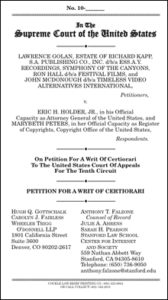Stanford Law School’s Fair Use Project Asks Supreme Court to Rule on Constitutionality of Restoring Copyrights in Foreign Works

Case affects the status of many famous works, including symphonies by Shostakovich and Stravinsky, books by Virginia Woolf, artwork by Picasso, films by Fellini and Hitchcock
STANFORD, Calif., October 20, 2010—Lawyers from Stanford Law School’s Fair Use Project (FUP) and Wheeler Trigg O’Donnell LLP filed a petition for a writ of certiorari today, asking the United States Supreme Court to review the constitutionality of a federal statute that removes thousands of foreign works from the Public Domain and places them under copyright protection. The FUP filed the petition on behalf of orchestra conductors, educators, performers, film archivists and motion picture distributors who relied for years on the free availability of works in the Public Domain, which they performed, adapted, restored and distributed. A 1994 amendment to the Copyright Act, the Uruguay Round Agreements Act (URAA), removed these works and many others from the Public Domain and placed them under copyright protection in conjunction with the implementation of intellectual property treaties. That amendment affected the copyright status of thousands of works by foreign authors that had been in the Public Domain in the United States for decades, including symphonies by Sergei Prokofiev, Igor Stravinsky, and Dmitri Shostakovich; books by C.S. Lewis, Virginia Woolf, and H.G. Wells; films by Federico Fellini, Alfred Hitchcock, and Jean Renoir; and artwork by M.C. Escher and Pablo Picasso, including Picasso’s masterpiece Guernica.
Petitioners Lawrence Golan, Estate of Richard Kapp, S.A. Publishing Co., Inc., Symphony of the Canyons, Ron Hall, and John McDonough originally filed suit in 2001, contending that in enacting the URAA Congress exceeded its Article I power and violated the First Amendment. A lower court rejected both claims and dismissed the case in 2005. In a 2007 decision, the Tenth Circuit revived petitioners’ First Amendment challenge. Following that decision, the same lower court held the URAA was unconstitutional under the First Amendment. The Tenth Circuit reversed that decision this summer, holding the URAA did not violate the First Amendment. Golan and his fellow petitioners are now asking the Supreme Court to review that decision.
“This goes back to the most basic premises of intellectual property: once a work of authorship or an invention is placed in the Public Domain, it belongs to the public, and remains the property of the public – free for anyone to use for any purpose. That principle was respected for more than 200 years, because it represents a critical limit on the intellectual property ‘monopoly’ the Framers authorized,” explained FUP Executive Director Anthony Falzone, who is counsel of record for the petitioners. “What Congress did here is a huge departure from those basic principles. It deserves the attention of the Supreme Court.”
The specific constitutional provisions at issue in the case are the Progress Clause [Article I, Section 8, Clause 8] and the First Amendment. The Progress Clause—sometimes called the “Copyright Clause”—gives Congress the power to “promote the Progress of Science and useful Arts, by securing for limited Times to Authors and Inventors the exclusive Right to their respective Writings and Discoveries.” Petitioners contend that removing material from the Public Domain violates the “limited times” restriction and the URAA as enacted does not “promote the Progress of Science and the useful Arts.” Petitioners contend the URAA violates the First Amendment because it is not narrowly tailored to any important government interest.
“We’re saying Congress cannot take the public’s property and hand it over to foreign authors,” added Julie Ahrens, Associate Director of the FUP and counsel on the case. “The right to perform a symphony, or distribute a film, is an important expressive freedom. Congress’s decision to take that freedom away demands close First Amendment scrutiny. If Congress is permitted to do that at all, it should be only for the most important reasons. The Tenth Circuit’s decision in this case suggests Congress can give away pieces of the public domain simply so authors can make more money on works they created long ago. We don’t think that’s correct.”
A PDF copy of the cert. petition is available by clicking here: Golan v. Holder – Petition for Certiorari.
To learn more, read the full press release and Anthony Falzone’s blog post Golan v. Holder Heads to Supreme Court.
